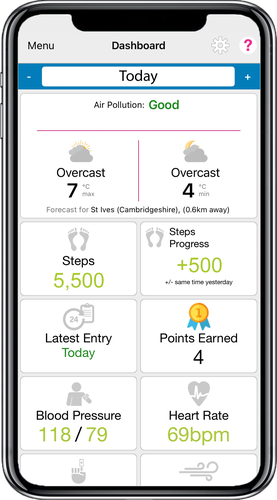

Caption: Active+me REMOTE for Cardiac and Pulmonary Rehabilitation helps us automatically add an extra 500 steps a day at a pace we can manage.
Walking an extra 500 steps a day in your 70s could significantly cut the risk of a heart attack and stroke. A study has found that those who walked the extra quarter of a mile each day lowered their chances of cardiovascular problems by 14%.
These findings suggest setting ‘attainable goals’ on fitness trackers could help to maintain good health in old age.
Most studies have focused on early-to-midlife adults with daily goals of 10,000 or more steps, which may not be attainable for older individuals. So in their study of 15,792 adults with an average age of 78, they focused on the health impacts of daily step counts in older people.
Experts from the University of North Carolina at Chapel Hill studied the walking patterns and habits of 16,732 women aged over 60 between 2011 and 2015. Compared with those who took fewer than 2,000 steps per day, those who walked around 4,500 steps per day had a 77% lower risk, with 12% and 3.5% respectively going on to experience a cardiovascular event.
Every additional 500 steps taken per day was incrementally associated with a 14% lower risk of cardiovascular disease, according to the findings presented at an American Heart Association conference.
Erin E. Dooley, Assistant Professor of epidemiology at the University of Alabama, who led the study said: “It’s important to maintain physical activity as we age, however, daily step goals should also be attainable. We were surprised to find that every additional quarter of a mile, or 500 steps, of walking had such a strong benefit to heart health.”
“While we do not want to diminish the importance of higher intensity physical activity, encouraging small increases in the number of daily steps also has significant cardiovascular benefits. If you are an older adult over the age of 70, start with trying to get 500 more steps per day.”
Additional research is needed to determine if meeting a higher daily count of steps prevents or delays cardiovascular disease, or if lower step counts may be an indicator of underlying disease.
Steps were only measured at one single point in time, and the researchers were unable to examine if changes in steps over time impacted CVD event risk, they added.
Reference
Prospective Association of Daily Steps with Cardiovascular Disease: A Harmonized Meta-Analysis.
Paluch AE; Bajpai S; Ballin M; Bassett DR; Buford TW; Carnethon MR; Chernofsky A; Dooley EE; Ekelund U; Evenson KR. (2023) 10.1161/CIRCULATIONAHA.122.061288
